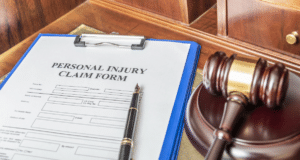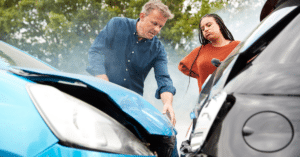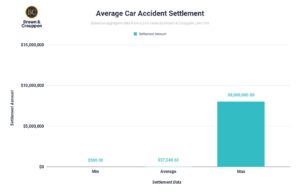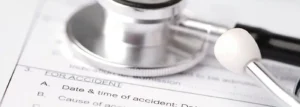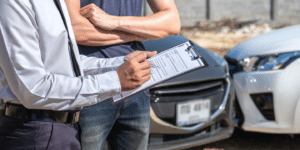- Duty To Stop and Report After a Minnesota Car Accident
- How To Obtain a Police Report in Minnesota After an Accident
- Why You Should Always Report an Accident, Even if It’s Minor
- What Happens if You Don’t Stop After an Accident or Report Injuries?
- What To Expect After Reporting a Car Accident in Minnesota
- Contact Brown & Crouppen for Help With Your Minnesota Car Accident Case
You do not have to file a police report after a car accident in Minnesota, but you must stop and, in many cases, remain on the scene. If there is an injury or death, you must also notify law enforcement immediately. The law enforcement agency that responds to your crash must file a report, which can be essential in determining liability for the crash.
At Brown & Crouppen, we assist car accident victims by educating them about their obligations, protecting their rights, identifying sources of compensation, and pursuing fair damages.
Duty To Stop and Report After a Minnesota Car Accident
Under Minnesota Statutes Section 169.09, you must stop after an accident and share information with the other driver if there is property damage, an injury, or a fatality. You must also contact the police and report an accident in Minnesota if someone is injured or has died.
To meet the requirements of this statute, you must take several steps, including:
- Step 1: Stop at or reasonably close to the scene, without obstructing traffic.
- Step 2: Determine if there are injuries, fatalities, or property damage.
- Step 3: Call 911 if there is an injury or death.
- Step 4: Render reasonable assistance to anyone injured.
- Step 5: Share information with the other driver, including name, date of birth, address or email address, and plate number.
- Step 6: Share insurance information. If you don’t have it, you must provide it within 72 hours.
- Step 7: Show law enforcement on the scene your driver’s license or permit.
Your health and that of others on the road come first. If you cannot safely exit your vehicle or move it, call 911 even if you aren’t injured. If possible, document the scene by taking photos and videos and ask witnesses for contact information.
How To Obtain a Police Report in Minnesota After an Accident
Police reports are available from Minnesota Driver and Vehicle Services three weeks after the accident. Complete the Crash Record Request Form and submit it in person at the DVS central office in St. Paul, at a full-service satellite office, or by mail. You can find a full-service office using the DVS locator tool.
Depending on which agency responded to the scene, you may have the option to get a police crash report by requesting it online. For example, Minneapolis has an online portal for accident reports. You’ll need your report number, so you may have to call the Minneapolis Police Records Information Unit for help at 612-673-2961. You can also email Police-RecordsInformationUnit@minneapolismn.gov.
Why You Should Always Report an Accident, Even if It’s Minor
Unless there is very clearly only minimal property damage and no injuries, it’s best to call 911 after a car accident. It is often not safe to move your vehicle off the road, and the police can direct traffic around your crash so others avoid it. They can also preserve any evidence at the scene.
Your accident may also be worse than you initially think. You may have hidden property damage due to the delicate nature of some modern vehicle technology. You could have an injury with symptoms that appear later, such as whiplash or a concussion.
If you call 911 and the operator tells you that it doesn’t sound serious enough to send officers, there is a record of your call. You can also contact the local police department directly, the county sheriff if your accident occurred on a county road, or the state police if your accident happened on a highway.
Do I Have To Report the Accident to My Insurance Company?
Report your accident to your insurance company if you need to claim damages. Minnesota is a no-fault insurance state, so you collect from your personal injury protection coverage first for medical bills and lost wages. You may also need to draw upon your uninsured, underinsured, or other coverage.
You must file a PIP claim within six months of your accident, but it’s best to do so as soon as possible to cover medical costs. If you fail to meet the reporting deadline, your insurer may deny your claim. Reporting quickly is also critical if your crash was with an at-fault uninsured or underinsured motorist, as you may have to draw on your policy for damages.
What Happens if You Don’t Stop After an Accident or Report Injuries?
In Minnesota, failing to stop after a crash, share information, and report injuries or death to the police can result in criminal charges, fines, and license suspension. Leaving the scene of a crash involving only property damage is a misdemeanor that can result in up to 90 days in jail and a fine of up to $1,000.
There are much harsher sanctions for leaving the scene or not reporting when crashes involve injuries or death. For example, if there was substantial bodily harm, the penalties are as follows:
- Driver didn’t cause the accident: 364 days in jail and a fine of up to $3,000
- Driver did cause the accident: A potential charge of criminal vehicular operation under Minnesota Statutes Section 609.2113, imprisonment up to three years, and a fine of up to $10,000
What To Expect After Reporting a Car Accident in Minnesota
It’s hard to focus on anything but your injuries and recovery after a car accident. But there are key steps to take to protect yourself, including:
- Contact your insurance company for PIP coverage.
- Contact the other party’s insurance company if they were at fault.
- Follow up with authorities to make sure there is an accident report and request one.
- Attempt to correct any misinformation in the report.
- Contact an experienced car accident attorney if there are problems with your crash report, an insurer asks for a recorded statement, or you receive a quick settlement offer.
- Take legal action if necessary to pursue the compensation you deserve.
A police report provides valuable information for an insurance claim or lawsuit. It contains the officer’s observations, vehicle and driver information, and a diagram of the accident, and may list citations issued to drivers. It may also include witness information you were unable to gather on your own.
If you have difficulty getting or interpreting your crash report, an experienced car accident attorney can assist you. They can also collect other essential evidence and negotiate with insurers that don’t offer fair damages.
Contact Brown & Crouppen for Help With Your Minnesota Car Accident Case
At Brown & Crouppen, we want you to understand your rights. While you do not have to file a police report after a Minnesota car crash, failing to stop, exchange information, and report injuries can have serious repercussions. The police must complete a report in most cases, and the information it provides can be critical to an insurance claim or lawsuit.
If you have significant damages or an insurer has already denied your claim, contact Brown & Crouppen right away so we can evaluate your case and discuss your legal options. We’re not afraid to take on insurance companies to protect you and your family’s future.
Reach out to our car accidents lawyers for a free case evaluation today by calling 800-536-4357 or completing our contact form.


